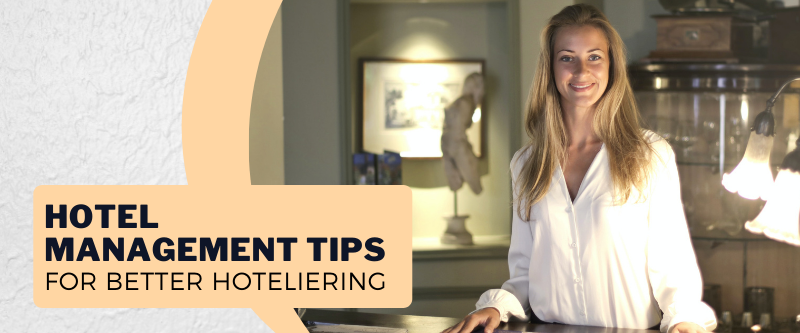Hotel management isn’t easy. It requires soft skills and hard skills — art and science. And to become great at this craft, you need years of experience, the right tools, and stellar organization systems.
Many hoteliering enthusiasts gather the courage and start their own venture, but then they find it hard to answer one question – how to manage the hotel business?
A hotel manager must also be a people person, balancing customer service, operations, and employees seamlessly. That’s why all hotel managers need some guidance along the way.
Table of Contents
Here Some Effective Tips for Successful Hotel Management
To help you manage your hotel better, there are certain things you must know and keep in mind. And in this section, I am going to state just that; some points that are going to change the way to handle things at your hotel.
1. Team Mentality
A guest’s experience is not determined by just one person, but by various people. It starts the moment a guest visits your hotel’s website to make a reservation and continues with the valet and bellhop the moment they arrive at the hotel. Then, the front desk takes it from there, and housekeeping finishes the job.
Of course, during their stay, they may also interact with food and drink staff, exercise instructors, and other hotel employees.
Your success as a hotel manager will largely depend on your ability to bring your entire staff together as one unit — a true team. And that team has one goal in mind: providing excellent service to your guests while increasing bottom-line revenue.
You can’t be over every team member’s shoulder throughout the day, but you can instil important values in your hotel that promote a thriving team including:
- Polite Conflict Resolution
- Clear Communication
- Adherence to Policies
- Helping Fellow Employees
- Going Above and Beyond for Guests
When hotel staff work together, it’s much easier to solve urgent problems. And it makes your work as a manager that much easier.
2. Follow Up With Event Leads
This is one of the most essential hotel management tips that you need to keep in mind.
Every hotel guest should be treated with equal amounts of respect and gratitude for patronizing your business. However, if there is one customer segment hotel managers should focus more time and effort on, it’s event leads.
Today’s hotel revenue depends even more on converting leads into paying guests. This is especially true with declining business due to the covid pandemic. Encouraging event organizers to gather in your hotel represents an excellent opportunity for revenue growth.
One guest at $150 per night is perfectly fine. But someone creating a conference or other event could bring 50, 100 or even 1,000 additional guests to your hotel. And there’s a big difference between $150 and $150,000 for your bottom line.
To follow up with event leads, you can use a range of methods such as:
- SMS Campaigns
- Personal Phone Calls
- Remarketing Ads
Regardless of the approach you take, make sure to follow up within less than a week of the lead first contacting you. That way, you have a much better chance at earning their business before another hotel does.
3. Leverage Social Media
We live in the age of social media. Traditional advertising — billboards, physical mail, radio, television, and telemarketing — still have its place. But nothing provides the ability to reach your market at scale as effectively and affordably as social media.
One excellent way to leverage social media is to repost photos that guests post while staying at your hotel. Encourage guests to take these photos by providing a catchy hashtag or geofilter for them to use.
You might even consider running a sweepstake with giveaways such as free stays in the future for anyone who participates in photo opportunities. Just be sure to ask permission before reposting any guest-generated content first.

4. Communicate
Communication is crucial for effective hotel management. A lack of communication leads to mistakes, which lead to crises. Mastering the art of communication will keep your team on the same page — ensuring important elements of the guest experience don’t slip through the cracks.
As the person in charge of hospitality, lead by example. Communicate early and often to address potential issues and maintain team alertness. Take responsibility for clearing explaining hotel procedures and communication protocols.
5. Stay On Top of Trends
Hotel trends are constantly changing — it’s par for the course in the hospitality world. What was sophisticated or trendy yesterday may be considered cliche or tacky in a few years time.
Hotel managers should bring in interior designers every few years to update the look and feel of the hotel based on data-driven guest preferences. And your hotel should reflect the current state of your market.
For instance, providing QR codes, extra cleaning, and social distancing protocols will demonstrate that you take guest safety seriously in a post-pandemic landscape.
Simply put, have a COVID-19 survival kit in place to better serve your guests and ensure they are safe at your property.
6. Hire Smart
It goes without saying that the staff you bring on board will largely determine the success of your hotel. The best location, architecture, and food won’t mean much if your staff is rude, inexperienced, or unfit for the job.
When hiring, aim to select candidates with the right attitude first. Almost everything else can be taught with time. Once you have the right staff, you have a decisive edge over other competing hotels.
7. Optimize Employee Scheduling
Employee scheduling for hotels can quickly become overwhelming from a management perspective. As we just mentioned, there are various employees and departments in a hotel at any given time.
These employees often have varying schedules — full time, part-time, night shift, day shift, and more. Keeping track of this is nearly impossible to do manually.
That’s why using hotel and hospitality scheduling software like ZoomShift is paramount. With ZoomShift, you can enjoy a single HQ for all employee scheduling needs such as:
- Clock In and Clock Out
- Schedule Changes
- Team Schedule Sharing
- Break Logging
And much more. With a full schedule of your own on your hands, managers can’t afford to waste hours every week on menial tasks.
8. Follow a Standard Operating Procedure
Next up, is one of the top-rated hotel management tips. Many hotels don’t weigh much on this aspect. However, that shouldn’t be the case.
Every hotel should have a Standard Operating Procedure (SOP). This is a list of rules and guidelines about how to perform each role in the company.
The SOP should be easily shared, such as a downloadable PDF or Google Doc. When an employee has a question, they can quickly turn to the SOP document to learn how to perform a task, or what the protocol is for a given situation — saving hours of time.
9. Incorporate Feedback
Nothing is more important to a hotel manager than feedback. It makes the difference between guessing on your next move or having objective data.
Firstly, there is feedback from employees. You can conduct employee feedback sessions during monthly or quarterly meetings. Make sure to provide your team with the feeling that they will not be punished for speaking their true feelings on matters. That way, you can gain key insights into areas of improvement for your hotel.
Secondly, aim to get feedback from every guest possible. You can leave feedback cards in your hotel, or follow up with an email survey. While someone might not feel comfortable voicing their concerns in person, a degree of privacy will help you discover what customers truly love or don’t love about your hotel experience.
Conclusion
A hotel’s success depends on great management. You are tasked with employee productivity, hotel operations, and customer happiness.
Of course, as you may have found out, it is anything but easy.
Current and aspiring managers that want to achieve great results for their hotel need proven strategies. And that is the reason this blog on ‘Hotel Management Tips for hotel Managers’ has been curated.
Implement the above-mentioned hotel management tips and witness greater productivity and increased hotel revenue.



